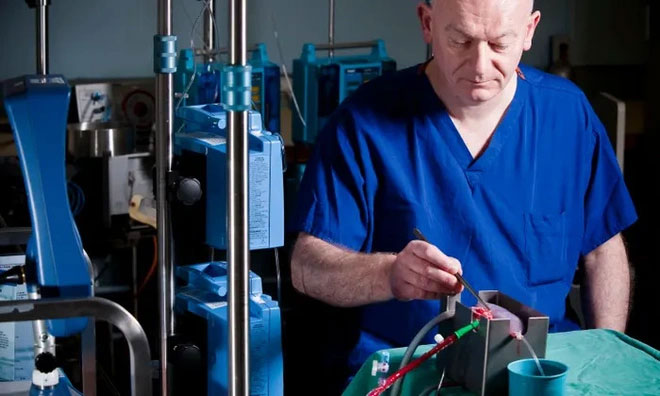The first successful conversion of blood type in a human kidney
Researchers have successfully changed the blood types of three donated kidneys, providing a greater chance for patients who can't find an organ source of the same blood type.
This new breakthrough could increase the supply of kidneys for transplant, scientists say, which is especially important for those who are less likely to find a suitable kidney, the Guardian reported on August 15.
Kidneys of people with blood type A cannot be transplanted to people with blood type B, and vice versa.
But changing these blood types to O will allow more transplants to take place because it is a "neutral" blood type, which can be suitable for many people.
To do this, the Cambridge University researchers applied a normothermic perfusion machine to deliver an enzyme through the donor kidney. This is a device that connects to a human kidney to pump oxygen-rich blood through the organ to better preserve the donor's kidney and improve the chances of a kidney transplant.
The enzyme removed blood group-specific molecules located on the blood vessels of the kidneys. That effectively converts the organ to type O blood.

Mike Nicholson, professor of implant surgery at the University of Cambridge, is working on this approach.
'We applied the enzyme to a section of human kidney tissue and quickly found that the antigens were eliminated,' said Serena MacMillan, a PhD student at the University of Cambridge.
'We knew then that the process was possible, and we just needed to scale the project up to apply the enzyme to a full-size human kidney,' she said.
'By testing a human kidney with type B blood and injecting enzymes into the organ with the normmothermic perfusion machine, in just a few hours we were able to convert a blood type B kidney into O,' she added. 'This can affect a lot of people's lives'.
- Blood groups reveal your health
- The truth about blood type in your body
- How to keep a man's blood type 'more valuable than gold'
- Correct understanding of blood type and blood transfusion principles
- Personality through blood type
- 5 health things related to your blood type
- The first cross-kidney transplant in Vietnam was successful
- Huge disadvantages that only blood type O people suffer
- Who is susceptible to kidney disease? Is there any way to improve kidney health?
- Blood type also affects civil rights?
- Interesting history of blood type A
- The method to protect the kidneys is healthy
 Norway built the world's tallest wooden tower
Norway built the world's tallest wooden tower Kremlin
Kremlin Ashurbanipal: The oldest royal library in the world
Ashurbanipal: The oldest royal library in the world Decoding the thousand-year construction of Qin Shihuang shocked the world
Decoding the thousand-year construction of Qin Shihuang shocked the world